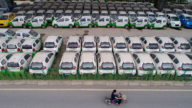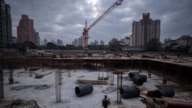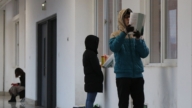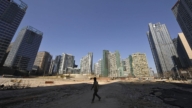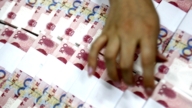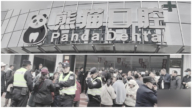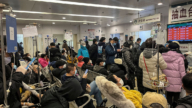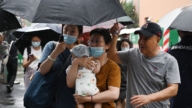【新唐人2014年03月15日訊】中共總理李克強週四承認,中國的經濟在2014年將面臨「嚴重挑戰」。同一天,國家統計局發佈的數據顯示,投資、零售和工廠產出的增長,下滑到多年來的最低。大陸經濟學家指出,2008年以來的四萬億大規模刺激方案,走到今天這一步,造成結構性失調和產能過剩,經濟下滑成為必然。
李克強在中共「人大」會議最後一天的新聞發佈會上講話,暗示北京今年將容忍更緩慢的經濟增長。
就在他講話之後不久,官方發佈的數據暗示,這種容忍面臨著一個考驗。
根據國家統計局週四發佈的數據,2014年1-2月份,規模以上工業增加值同比實際增長8.6 %。從環比看,2月份比上月增長0.61%。英國《路透社》認為,這標誌著中國工廠產出,自從2009年四月份以來的增長速度,呈現最差表現。
而零售業的增長也達到三年來的最緩慢。一、二月份同比增長11.8%。
作為經濟活動的一個重要驅動力的「固定資產投資」,表現的更差。它在今年頭兩個月同比增長17.9%,這是11年以來的最低水平。
北京「天則經濟研究所」副所長馮興元表示,中國經濟形勢這幾年不是特別好。投資增量不斷往下走。究其原因還是所謂的產能過剩。實際上就是「凱恩斯主義」那一套做法本身它有局限性。「凱恩斯主義」認為,要維持一定的經濟高增長,就必須不斷增加投資。
北京天則經濟研究所副所長馮興元:「這意味著不斷的促進需求,拉動需求。他這種邏輯本身是有問題的。你怎麼能不斷的拉動需求,把這個作為整個社會整個國家生活的目標?經濟增長當然是好事情,但是純粹為了增長而增長,不斷的想著一定要通過拉動需求這種做法,這個想法,這個理念本身是錯誤的。」
馮興元表示,中國的經濟結構性失衡在2008年以後加劇。政府為了維持高增長,抵禦來自美國的全球金融危機可能帶來的波及後果。中共政府搞了四萬億大規模刺激經濟的一攬子方案。
馮興元:「主要的資金走向了中央國有企業,地方國有企業,還有國家的基礎設施項目,也就是『三國』渠道。這樣投資的結果主要是國有部門拿到了錢,民營經濟的生存環境是惡化的。這種格局下面,結果就是整個經濟的結構性失衡加劇。」
一些經濟學家相信,今年的增長目標可能達不到。
《路透社》報導,法國「興業銀行」中國經濟學家姚偉在週四數據出爐之後表示,中國的經濟「勢頭真的相當疲弱。」「第一季度的GDP增長可能已經低於7.5%。政府將可能推出一些寬鬆政策。」她預計,央行將減少銀行儲備金50個基本點。
馮興元指出,如果不進行金融改革,單純推行寬鬆貨幣政策發揮不了很大作用,因為資金還是很難到達民營企業手中。
馮興元:「現在很多錢實際上是從金融部門轉幾手,大家都分些錢,到要求利息率很高的時候才放到需要者手裡。包括資金在國有銀行再轉到國有企業,或者上市公司,再通過委託貸款或者信託貸款,再放到民營企業家手裡的時候,要求的利息率,或者管理費都已經非常高了。所以單純推行擴張的貨幣政策沒有用。」
馮興元指出,在中國巨大的金融部門裡面循環著大量資金,經過多次循環之後,才能到達實體經濟。效率非常低。他認為,需要發展更多的中小銀行。單純的擴張貨幣供應量,也許還會製造其他麻煩,比如通貨膨脹。
李克強在新聞發佈會上暗示,他將容忍低於目標的GDP增長速度。他說,「GDP增長目標大約是7.5%。『大約』意味著有一些彈性,我們有一些容忍度。」而「增長的底限必須確保創造就業。」
但是,親GDP增長的「國家發改委」主任徐紹史週三說,7.5%的目標已經是政府的底限。
而在上海「超日太陽能科技公司」的五年債券上週五未能支付利息之後,李克強也暗示,政府將允許更多的債務違約。
採訪編輯/秦雪 後製/黎安安
Li Keqiang: The CCP Faces A Serious Economic Challenge in 2014
The Chinese Communist Party’s (CCP) premier Li Keqiang
said on Thursday that China’s economy faces
a “serious challenge" in 2014.
On the same day, the State Statistics Bureau reported that
China’s economic growth in investment, retail and industrial
production dropped to its lowest point in recent years.
A Chinese economist commented that it is the CCP’s
4-trillion-yuan economic stimulus package in 2008
that resulted in the present structural imbalance
and economic overcapacity.
Therefore a drop in economic activity
is indeed unavoidable.
Li Keqiang gave a talk at the press conference after
the annual of the National People’s Congress (NPC) sessions.
Li’s talk suggests the CCP authority is prepared to accept
a significant economic slowdown.
Some economic statistics were officially announced
immediately following Li’s talk.
The statistics suggest that the challenge will not be easy
for the party leaders to endure.
The State Statistics Bureau reported on Thursday that
the industrial output rose by 8.6 percent
during the January-February period.
February’s rise in industrial output edged up slightly
by 0.61 percent from January.
Reuters commented that this has been the worst
performance of China’s industrial production since
April, 2009.
The January-February retail sales increased by 11.8 percent,
which is also reportedly the lowest in three years.
Another important index of economic motivation,
the fixed-asset investment, shows even worse performance
in the first two months of 2014.
The 17.9 percent in the period growth is the lowest
compared to the same months in the past 11 years.
Feng Xingyuan, Deputy Director of the Unirule Institute
of Economics, agrees that China’s economy,
has not been in good shape recently.
The incremental investment continues to drop
due to overcapacity.
Feng said, fundamentally speaking, the theory
of Keynesianism is limited in stimulating economic growth.
Keynesianism believes that an increase in investment
is a must in order to maintain economic growth
at a relatively high level.
Feng Xingyuan, Deputy Director of the Unirule Institute
of Economics: “Keynesian theory suggests a stimulus of
demands to produce economic growth.
Such logic is itself flawed.
How can you ceaselessly motivate economic demands
and even make it an ultimate goal of the whole state?
Of course, economic development is a good thing.
However, it is wrong to simply seek economic growth over
anything else and therefore always artificially
stimulate demands."
Feng said China’s economic structural imbalance
has become worse since 2008.
That year, the CCP authorities issued a 4-trillion-yuan
stimulus package to maintain China』s fast economic growth
against the global financial crisis from the United States.
Feng Xingyuan: “Most money had flown into central
state-owned enterprises, local state-owned enterprises
and state infrastructure projects.
These are called the ‘Three State Agencies’.
So the fact is, these state-owned departments had
occupied the most funding resources
and the private economy continues to worsen.
In such a condition, there have been more imbalances
in the whole state’s economic structure."
Some economists believe that this year the CCP may not
be able to achieve its goal in GDP growth.
Reuters reported that Chinese economist for Societe
Generale Yao Wei said after Thursday’s data
that the momentum in China’s economy is really weak.
Yao said, “Quarter one GDP growth is probably already below
7.5 percent; the government will probably do some easing."
Yao speculated that the CCP』s Central Bank would reduce
the bank reserve requirements by 50 basis points.
Feng Xingyuan commented that Quantitative Easing would
not work well without any financial reform, as the funding
resources are still hardly available for private enterprises.
Feng Xingyuan: “Currently a lot of funding has transferred
several times between financial sectors to make profits
before reaching those who need the money, however
already at high interest rates.
The money first goes from state-owned banks to state-owned
enterprises or listed companies.
It then goes to private companies via trust loans.
However, at that stage the interest rates and management
costs are very high.
Because of that, there is no way the Quantitative Easing
Policy will work by itself."
Feng said a huge amount of capital have to circulate
again and again among the CCP’s financial agencies
before stimulating the economy.
Such a process is extremely inefficient.
Feng believes that it is necessary to develop
more middle-level or small-sized banks.
Simply increasing money supply will also result
in other problems such as inflation.
In his press conference, Li Keqiang suggests he will be able
to accommodate a GDP growth lower than the target.
Li said, “The target for GDP growth is about 7.5″,
“There is some flexibility here",
“We have some tolerance on this issue".
Li also said the bottom line is that the GDP growth
has to produce more job opportunities.
On the other hand, Xu Shaoshi, head of the pro-growth
National Development and Reform Commission, said
on Wednesday that a GDP growth of 7.5 percent is
the lowest limit that the party can accept.
Last Friday, Shanghai Chaori Solar Energy Science
and Technology Co. failed to make a full payment
on its five-year bonds.
Li Keqiang’s speech also suggests the CCP
may allow more debt defaults similar to that.
Interview & Edit/Qin Xue Post-Production/Li An’an


